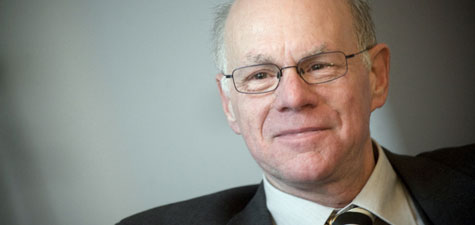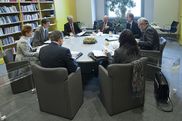Navigationspfad: Homepage > German Bundestag > Presidium
Professor Norbert Lammert, President of the Bundestag

The President of the German Bundestag, Professor Norbert Lammert © German Bundestag/Marc-Steffen Unger
Professor Norbert Lammert has served as President of the German Bundestag since October 2005. On 22 October 2013, the Members of the Bundestag re-elected him to the top parliamentary post. In terms of protocol, he ranks second only to the President of the Federal Republic. As President of the Bundestag he ensures that Parliament’s rules are upheld and represents Parliament in the public sphere. He also heads the Bundestag Administration, which has around 2500 members of staff, and the Bundestag police.
Political career
Norbert Lammert was born in 1948. After obtaining his Abitur (higher-education entrance qualification) and completing military service, he studied political science, modern history and social economics in Bochum and at Oxford.
He joined the Christian Democratic Union (CDU) in 1966. In 1975, he obtained his doctorate in social science. After holding a range of political posts at local and regional level, he was elected to the Bundestag in 1980. He served as deputy chairman of the Committee for the Scrutiny of Elections, Immunity and the Rules of Procedure from 1983 to 1989, then as a parliamentary state secretary at various federal ministries in the 1990s.
Above the party fray
Regarding his post as President of the Bundestag, he says: "This post is unlike almost any other political office, in fact, because it is clearly positioned at the heart of the political action, not outside of active politics, yet at the same time the President is – as laid down in the Bundestag’s Rules of Procedure – above the party fray. This balancing act demands a great deal of skill at times and is, in a sense, a never-ending intelligence test which every President is required to undertake."
Cultural policy: not a diversion
Norbert Lammert ensures that Members do not cross the line in the Bundestag’s lively debates. "In my opinion, it does the Bundestag no harm for there to be lighter moments amidst the serious matters we deal with," he says.
He is keenly interested in cultural policy. In his view, art is not one of life’s most pleasant diversions; it is one of the essentials. "Because what will remain of this generation in our country’s collective memory is not the tax laws we have passed, or the miles of motorway we have built, or the benefits we have increased or reduced; it is our artistic and cultural achievements which will be passed on to future generations," Lammert says.


